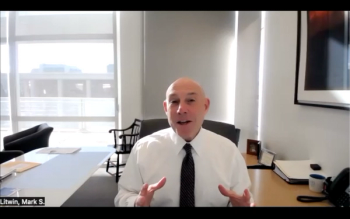
Dr. Rickey offers three points to women considering urology
"I have worked in some fantastic urology departments where I've been supported by an amazing group of faculty and colleagues," says Leslie M. Rickey, MD, MPH.
“Women in Urology” is a new Urology Times section in which women in the field share their path to the specialty and give advice for women considering a career in urology. Stacy Loeb, MD, MSc, assistant professor of urology and population health, New York University Langone and the Manhattan VA, New York, serves as section editor for “Women in Urology.” This installment features Leslie M. Rickey, MD, MPH.
Please describe your practice type and area(s) of clinical/research interest.
I am an associate professor in the department of urology at Yale University with a secondary appointment in the department of obstetrics, gynecology & reproductive sciences. We are fortunate at Yale to have an integrated section of urogynecology and reconstructive pelvic surgery along with a female pelvic medicine and reconstructive surgery (FPMRS) fellowship for which I am the program director. My clinical and research interests focus exclusively on women with pelvic floor disorders, and I serve as Yale’s Principal Investigator in the NIH/NIDDK-funded Prevention of Lower Urinary Tract Symptoms (PLUS) Consortium.
What prompted you to pursue urology as a specialty?
I started medical school with little knowledge of urology as a specialty and really had not considered surgery as an option for my career. Urology was my first surgical rotation and I found that I resonated with the urology residents and faculty more so than any other group. Although I loved being in the operating room and received a lot of positive feedback, I still had a hard time envisioning myself as a surgeon. Honestly, it took a push from one of the urology interns at Tulane at the time (shout out to Dr. Wes Bryan!) who encouraged me to pursue the specialty. It was a long way from the pediatric public health path I had imagined for myself, but once I made the mental switch, I never looked back.
Although women are becoming increasingly prevalent in urology, they are still greatly outnumbered by men. What challenges do you face as a woman working in a specialty that is mostly male?
I have worked in some fantastic urology departments where I've been supported by an amazing group of faculty and colleagues. Dr. Bob Flanigan continues to be an inspiration and cheerleader, Dr. Linda Brubaker provided an incredible clinical and research foundation in FPMRS, Dr. Toby Chai has mentored and nurtured my research career, and Dr. Pete Schulam gave me the resources to achieve an integrated FPMRS training program with our gynecology colleagues.
Also see -
One of the main challenges as a mid-career-level female in urology is the lack of female role models in leadership positions in academic institutions and at the national level. The Society of Women in Urology is critical in filling this gap for me as the group brings together women in urology from all specialties and locations into one place. In addition to providing a wonderful support and advice network, we are also able to act as mentors and sponsors for each other as we move through our careers.
Next:
There are three points I make with young women who contact me asking for advice about urology as a career. First, I tell them that the people-both colleagues and patients-make it a great field to pursue.
Many ask me about work-life balance, so my second point is to consider the degree of unpredictability that comes with being a surgeon. I tell them that it is possible to create boundaries that allow you to recharge and spend time with family and friends. While this balance can be very challenging to maintain at times, it is helpful that there is a growing appreciation for physician wellness and flexibility with work schedules. In addition, everyone needs a support system, and there is no way I could do what I do at work and home without the support and encouragement of my wonderful husband Jay.
My third point is that I’ve been very happy with my choices, and from my experience they should not worry about being a woman in this profession, but should instead base their decision on how well they like the specialty and the lifestyle.
Newsletter
Stay current with the latest urology news and practice-changing insights — sign up now for the essential updates every urologist needs.






